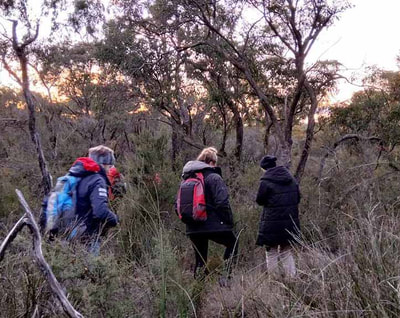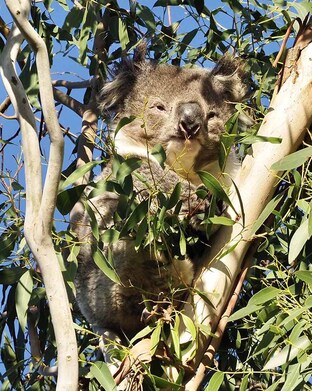 Koala poo hunt, Adams Creek Nature Conservation Reserve, June 2020
Koala poo hunt, Adams Creek Nature Conservation Reserve, June 2020 GENETIC analysis has confirmed a researcher’s hypothesis that koalas in the Western Port Woodlands are descended from the original Victorian population, known as the Strzelecki koalas.
Kelly Smith, who is completing a thesis on her research at Federation University, says the proof came from scat samples collected by volunteers in Bass Coast and South Gippsland in June.
Kelly says the positive identification in Grantville gives impetus to the campaign to protect remaining Western Port Woodland habitat.
“There would most definitely be other remnant koalas in that bushland area all along the Western Port and beyond. Finding more koalas would enable us to get a better understanding of any inbreeding occurring, distribution, abundance and any isolated populations.”
 Adams Creek NCR, July 2022. Photo: Dave Newman
Adams Creek NCR, July 2022. Photo: Dave Newman With koalas having been listed as endangered in NSW, Queensland and the ACT earlier this year, she says a new genetically diverse population could be crucial to a national recovery plan.
Victoria has no shortage of koalas but they are almost all descended from the French Island koala population. This was an insurance colony introduced to the island in the 1890s after koalas were just about wiped out by hunters. Since then their descendants have been used to repopulate Victoria and Kangaroo Island. The problem is their low genetic diversity.
The original population has much higher genetic diversity so is potentially better equipped to deal with disease and other challenges, including climate change.
As far as scientists knew until recently, Victoria’s non-French Island koala population only numbered about 1500, found on the south-eastern edge of the Strzelecki Ranges, near Yarram.
Kelly never believed it. “They just assumed the other koalas were extinct and that the koalas in Victoria are all inbred translocated koalas. That’s when they found the koalas in the Strzeleckis. They’re not translocated at all, they’re the original population. Now we’ve got to try and find other populations.”
Her research project involved recruiting volunteers – “citizen scientists” – to collect scat samples on the Mornington Peninsula and in the Western Port Woodlands.
The Mornington Peninsula koalas were found to be descended from the French Island population.
Kelly said the volunteers’ efforts proved to be 60% successful in collecting quality scats for DNA analysis. She hastens to add that 60 per cent is a great success rate, about the same as using detection dogs.
“That just means that if we collected 100 samples 60 of them would work because a lot of the time the DNA is damaged from the rain or mildew, too mouldy or too old or not from a koala (eg. it could be possum scat).